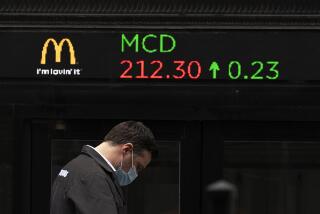Ticker Talk
- Share via
Mutual fund managers would be required to disclose to investors the impact of taxes on the bottom line under legislation approved Monday by the House. The Securities and Exchange Commission is already at work on regulations to do that. Taxes can be the biggest cost associated with mutual funds, with the average investor losing as much as 3 percentage points of return each year due to taxes, according to the House Commerce Committee. About half of the $6 trillion invested by 83 million Americans in mutual funds is in taxable accounts. Although some mutual funds have begun to include tax costs on their annual reports and prospectuses, the majority do not, leaving out a crucial piece of information for people who are trying to determine where to invest their money. In addition, portfolios with high turnover rates tend to trigger higher taxes--and those high turnover rates are increasing. “This is the type of information a fund investor should have,” said Rep. Paul E. Gillmor (R-Ohio). “It is very difficult to make an intelligent decision without it.” . . . Kroger Co. (KR), the largest U.S. supermarket chain, said it will buy back as much as $750 million of stock, or about 5% of its shares outstanding. The Cincinnati-based company, whose shares have sunk 37% in the last 12 months, said the buyback replaces a $100-million plan announced in January. Timing of the purchases will vary according to market conditions, the company said. Joseph Pilcher, Kroger chairman and chief executive, said the shares are undervalued given the company’s growth prospects and success in achieving savings from the purchase of Fred Meyer Inc. for $13.5 billion in May. Kroger and other supermarket stocks have fallen in the last year on concern about the integration of large acquisitions and investors’ preference for technology stocks. Kroger shares rose $1.31 on Monday to $18.88 on the New York Stock Exchange.
More to Read
Inside the business of entertainment
The Wide Shot brings you news, analysis and insights on everything from streaming wars to production — and what it all means for the future.
You may occasionally receive promotional content from the Los Angeles Times.










